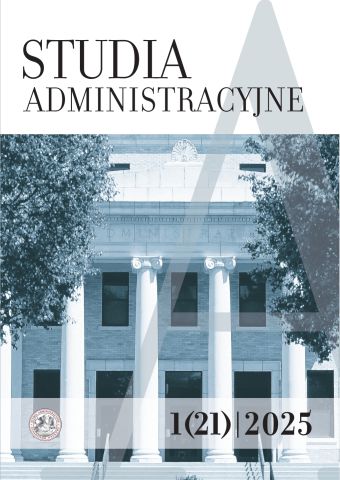






| Authors: |
Jan
Brzuchalski

Uniwersytet Warszawski, Wydział Prawa i Administracji |
| Keywords: | right to public information exclusion of employee simple information special public interest administrative body |
| Whole issue publication date: | 2025 |
| Page range: | 12 (47-58) |
| Downloads ?: | 133 |
| 1. | Literatura |
| 2. | Chróścielewski W., Glosa do uchwały NSA z 22 lutego 2007 r., II GPS 2/06, Zeszyty Naukowe Sądownictwa Administracyjnego 2007, nr 3. |
| 3. | Fajgielski P., Informacja w administracji publicznej. Prawne aspekty gromadzenia, udostępniania i ochrony, Wrocław 2007. |
| 4. | Jabłoński M., Udostępnianie przetworzonej informacji publicznej, Wrocław 2015. |
| 5. | Pudzianowska D., Dostęp do informacji publicznej, (w:) Prawo administracyjne, red. J. Jagielski, M. Wierzbowski, Warszawa 2020. |
| 6. | Kotulski M., Organy administracji publicznej, (w:) Przewodnik po prawie administracyjnym, red. W. Jakimowicz, Warszawa 2016. |
| 7. | Sitniewski P., Odmowa dostępu do informacji publicznej. Przesłanki, granice, procedura. |
| 8. | Sługocki J., Prawo administracyjne. Zagadnienia ustrojowe, Warszawa 2023. |
| 9. | Jaśkowska M., O pojęciu informacji publicznej raz jeszcze, Zeszyty Prawnicze 2020, nr 3 (20). |
| 10. | Sibiga G., „Informacja przetworzona” i „przetworzenie informacji” po nowelizacji ustawy o dostępie do informacji publicznej z 16.9.2011 r., Kwartalnik Prawa Publicznego 2012, nr 3 (12). |
| 11. | Akty prawne |
| 12. | Konwencja o Ochronie Praw Człowieka i Podstawowych Wolności z 4 listopada 1950 r. (Dz.U. z 1993 nr 61 poz. 284). |
| 13. | Ustawa z 14 czerwca 1960 r. Kodeks postępowania administracyjnego (tekst jedn. Dz.U. z 2024 r. poz. 572). |
| 14. | Konstytucja Rzeczypospolitej Polski z 2 kwietnia 1997 roku (Dz.U. z 1997 nr 78 poz. 483). |
| 15. | Ustawa z 6 września 2001 r. o dostępie do informacji publicznej (tekst jedn. Dz.U. z 2022 r. poz. 902). |
| 16. | Orzecznictwo |
| 17. | Orzeczenie TK z 13 marca 1996 r., sygn. K 11/95. |
| 18. | Postanowienie NSA z 8 listopada 2012 r., sygn. II OZ 958/12. |
| 19. | Postanowienie NSA z 16 stycznia 2013 r., sygn. II GSK 2054/12. |
| 20. | Postanowienie NSA z 18 listopada 2021 r., sygn. II GSK 318/21. |
| 21. | Uchwała NSA z 18 lutego 2013 r., sygn. II GPS 4/12. |
| 22. | Wyrok Europejskiego Trybunału Praw Człowieka z 28 września 1995 r. sygn. 14570/89. |
| 23. | Wyrok Europejskiego Trybunału Praw Człowieka z 8 lutego 2000 r. sygn. 28488/95. |
| 24. | Wyrok TK z 13 listopada 2003 r., sygn. K 51/02. |
| 25. | Wyrok TK z 15 grudnia 2008 r., sygn. P 57/07. |
| 26. | Wyrok TK z 6 grudnia 2011 r., sygn. SK 3/11. |
| 27. | Wyrok TK z 18 grudnia 2018 r., sygn SK 27/14. |
| 28. | Wyrok NSA z 21 września 2012 r., sygn. I OSK 1477/12. |
| 29. | Wyrok NSA z 10 stycznia 2014 r., sygn. I OSK 2111/13. |
| 30. | Wyrok NSA z 24 września 2015 r., sygn. I OSK 1762/14. |
| 31. | Wyrok NSA z 25 kwietnia 2018 r., sygn. I OSK 2373/17. |
| 32. | Wyrok WSA w Gdańsku z 13 listopada 2013 r., sygn II SA/Gd 648/13. |
| 33. | Wyrok WSA w Gliwicach z 17 czerwca 2016 r., sygn. IV SA/Gl 194/16. |
| 34. | Wyrok WSA w Poznaniu z 10 stycznia 2018 r., sygn. II SAB/Po 162/17. |
| 35. | Wyrok WSA w Warszawie z 4 maja 2021 r., sygn. II SA/Wa 2560/20. |
| 36. | Wyrok WSA w Szczecinie z 17 stycznia 2024 r., sygn. I SA/Sz 634/23. |